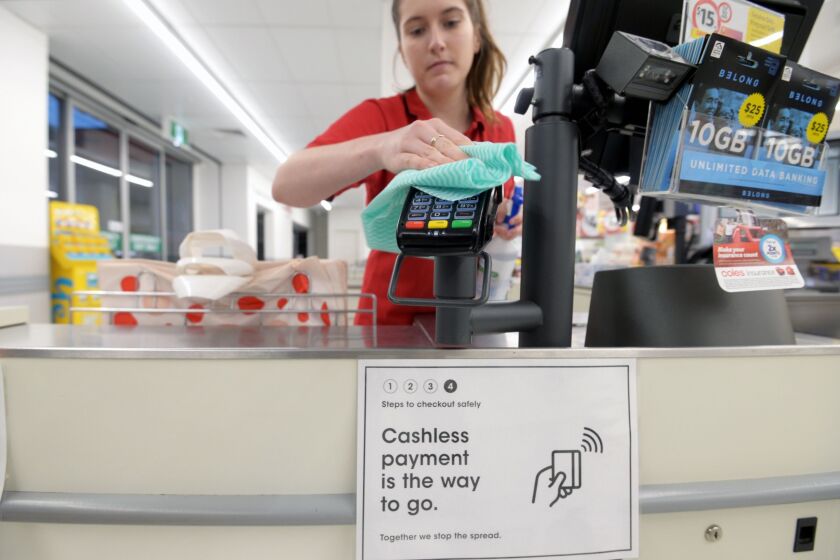Merchant acquiring is a very face-to-face, sales-oriented business. And that culture has to change before any acquirers can convince their clients that they know how to adapt to the coronavirus pandemic.
The unprecedented shutdown on social interaction, combined with the clunkiness of legacy payments technology, is forcing many merchants to find a way to handle payments digitally. Acquirers must adapt even more quickly to be able to solve their clients' problems remotely.
"On the sales side, 90% of companies are still using paper applications and sitting down face-to-face with their merchants and just doing what they always have done; and it's been fine up to now because it worked for them," said Richard McShirley, chief marketing officer for linked2pay, a payment provider that has long stressed digital payments and underwriting.
In many ways, digital underwriting is far better because it eliminates errors in submitted applications, McShirley said.
"Turnover of sales people dictates that people are always being trained and always submitting applications that are missing something," he added. "Automated processes not only remind the applicant about what is required; [they] can also instantly know if something isn't accurate."

Companies struggle with converting to automated merchant applications because they are so used to a group of employees breaking down the application's various pieces to determine whether to underwrite or research further. When operating under that sort of gateway approach, it is sometimes difficult to suddenly convert to a digital smart application process.
But it's still possible to maintain a one-on-one relationship with a client through account managers and the tools of new technologies, said Suneera Madhani, CEO of Fattmerchant, which has been acquiring customers digitally the past six years.
The Institute of Internal Auditors is giving corporate America only a modestly better grade on governance in 2020 compared to 2019, and any improvement is probably due to the coronavirus pandemic.
President-elect Joe Biden’s $1.9 trillion COVID-19 relief plan is designed to both pump money into the economy and contain the coronavirus pandemic.
President-elect Joe Biden’s $1.9 trillion economic relief proposal serves as the opening salvo in a legislative battle that could be prolonged by the go-big price tag and the inclusion of initiatives opposed by many Republicans.
Even in a normal environment, "we don't actually meet our merchants one-on-one. We conduct all of our business online ... we do our consultations over the phone and over Zoom, and we do demos online" Madhani told PaymentsSource on the PayDirt podcast. "Even their integrations into their point of sale systems [are] also done virtually."
Even without the coronavirus forcing more companies and merchants to look at business in this way, Madhani says doing business in this manner has already proven to be sustainable and scalable.
"Every conference I attend, there is always a session on what they call 'the death of the ISO,' and I don't think there is a death of the ISO," she added. "But there are certain traditional business models that will not make it through, after coronavirus, in the current ecosystem."
Sal Gagliano, director of sales for True Rate Payments in Thousand Oaks, Calif., knows firsthand what it is like to convert from legacy systems to streamlined, virtual platforms.
"I rarely used paper applications in the past, but most of the systems or processes I was using were archaic," Gagliano said. "The systems were broken, but the linked2pay platform streamlined everything for me from start to finish. In the past, my clients had to e-mail me documents, now they just upload to a portal to make things much easier."
Gagliano says he has seen sales leads increase through the new technology, providing merchants with various options to accept payments over the phone, on a website or an online payment form.
It's a good time for acquirers to move into virtual sales, payments and other services, particularly because it gives them an opportunity to stand out in a way that their merchant customers will appreciate — and ultimately likely to remain loyal.
"ISOs, payment facilitators and third-party providers like Square, PayPal, Shift4 and several others are providing merchants with financial assistance, rate relief and loan support," said Steve Mott, principal of BetterBuyDesign consulting. "They will be remembered."
Because acquirers and ISOs "do the heavy lifting for the industry," they have the means, motive and opportunity to open payments up for innovation and efficiency, Mott added.
"It will be interesting to see which ones have their sails up to catch the breezes when they come back" from the coronavirus' effects, Mott said.
As with anything related to long-time users of legacy payment systems and networks, the path to new technology is sometimes fraught with challenges and inner fears. With coronavirus, those uneasy feelings multiply.
"What I've recognized over the years is that many ISOs are resistant to change, yet in the current environment there really is no choice," said Marc Beauchamp, founder of Bankcardlife in Woodlands, Texas. "If they want to continue to conduct business, they must adopt a 'contactless' or virtual sales model to ensure business continuity."
Much of what is happening now because of coronavirus is exposing a major weakness in many ISO services portfolios — if they operate on a single legacy platform, it puts them in a search mode to find a service or partner who can send something new to a merchant, whether it is an ACH payment click button or a virtual terminal.
"The organizations that embrace an integrated approach to selling, underwriting and onboarding new business will have a distinct advantage in the future economy," Beauchamp added. "I believe social distancing is going to create a drastic shift on how payment processing is sold and delivered, and sales partners are looking for processors that offer an ecosystem of integrated payments."
Linked2pay's McShirley likens it to a famous children's fairy tale in summing up what acquirers and ISOs are facing.
"It's almost like the Three Little Pigs story here, big time, in that people don't learn their lesson," he said. "In our industry, people would rather have totally inferior technology than share a piece, even a small part, of their revenue for something better, and that's been a problem for a long time."
Ultimately, those acquirers who have specialized on specific verticals, whether it is quick-serve restaurants or beauty salons or some other niche, could suffer greatly from a crisis like coronavirus because they have nowhere else to turn, McShirley added.
"Companies have to be more horizontal than vertical and think about what they can do so that maybe there are other opportunities to move forward with," he said. "They have to look at platforms to address all businesses and even look at B2B possibilities."





